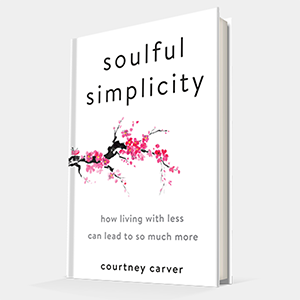
This is a guest post by Courtney Carver. I had the opportunity to read a pre-publication edition of Courtney’s new book Soulful Simplicity, which will be published December 26th by Tarcher/Perigee, a division of Penguin Random House, and I asked if she would like to write a piece about one of the ideas I found particularly compelling. Enjoy!
There is so much to pay attention to each day. We always seem to be in a constant state of checking our to-do lists, falling behind, catching up and overextending ourselves in the name of doing it all. It’s not just our to-do lists either. It’s the stuff in our homes, the stuff we wish were in our homes and our jam-packed calendars. It’s all the stuff surrounding us, and all the stuff within is. We do our best to hold it all together, to hold on tight … but holding on may be holding you back.
When you hold on to everything, you can’t engage in anything in a meaningful way. Instead of being able to devote your time and attention to something, you spend it bouncing from thing to thing to thing. Imagine what it would feel like if you had more space to live the way you want to live, more time to create what you want to create, and more energy, attention and love for the people who really matter to you.
Two steps for making room for what matters
- Let go.
Begin to edit out the things that don’t matter. As you begin to let go, watch for excuses for holding on. Our brains will search for ways to hold on because it feels comfortable. The just in case excuse for holding on to things is a messy combination of fear and procrastination. We hold on because we aren’t quite ready to let go, but we rarely use or enjoy the just in case stuff we keep. Take a look in the back of your closet, in the junk drawer, under the sink or in boxes in the garage or attic and it’s clear that just in case rarely ever happens.
Challenge what you think is true and live without something you think you should hold on to. Instead of conquering your just in case fears overnight, prove yourself wrong. Make a little just in case box and fill it with all the things that you think you might need someday. Put the box out of sight and don’t label the box with the contents. If after 30 or 60 days you forget what was in the box, or realize you never had to retrieve a just in case item, donate the box.
Joshua Millburn and Ryan Nicodemus, founders of theminimalists.com, created the 20/20 theory, proving that almost any “just in case” item that you get rid of can be replaced for less than twenty dollars in less than twenty minutes. You usually don’t have to replace it, but knowing that should alleviate some of the anxiety of letting go. Use this theory to remove some of your fears about those pesky “just in case” items. When you realize you’ve been holding on to things for the wrong reasons, it will be easier to let go.
Letting go may feel hard, but holding on is harder. You have to hold on every single day. You hold on by paying for items with your money, time, attention, and emotion. You only have to let go once.
Letting go of things that don’t add value to your life will help you …
- Create space
- Better understand what enough means to you
- Make decisions with more ease
- Find more in less
- Connect with what matters most to you
Just in case doesn’t just apply to clutter and things in our homes. What else is going on in your life that you are holding on to out of fear? What are you holding on to because you aren’t ready, or because you are afraid to let go, or afraid you won’t have enough? When I began to let go of my just in case clutter, little pieces of fear went with it and it became easier to let go in other areas of my life.
- Be Present.
If you are paying attention to what didn’t get done yesterday or what needs to get done tomorrow, your full attention can’t be on what’s going on right now. How can you be your most creative, most interested, and do your best work, when you have anxiety about the undone? Choosing to be present sounds easy, but it’s not. To practice, set a timer for 15 minutes and agree to set your worry aside for that short amount of time while you engage in the here and now.
A few ways to become more present include connecting to your breath, taking a walk, sitting quietly and writing down your thoughts before they take you out of the moment. Being present may not come easy. It takes practice. Set aside a few minutes each day to practice presence.
Holding on is holding you back, but you can choose to let go and be present to create a life full of what matters most to you.
Courtney Carver changed her life by simplifying it after a devastating diagnosis in 2006. She’s the founder of bemorewithless.com and minimalist fashion challenge Project 333. In her new book, Soulful Simplicity, Carver shows the power of simplicity to improve your health, build more meaningful relationships, and relieve stress in your professional and personal life.
What are you holding onto “just in case” that you should part with? Please join the conversation with your comments…
Best regards,
David
